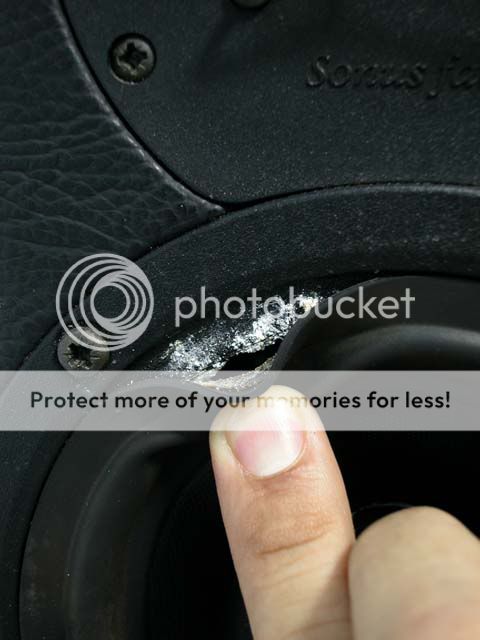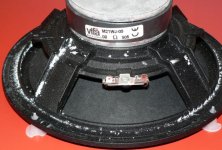You may want to go to a car parts store and ask if they have anything meant for raw aluminum wheels to prevent oxidation. My father has some Fikse wheels, and I think he puts something on it to prevent it from corroding.
surrounds
Rick: yes, if the drivers were sitting on their surrounds, these and the spider are most likely permanently deformed (the spider should be essentially flat from basket to cone, if you average over its waves). This will change the zero position and hence Bxl and distortion. You might be able to repair them by storing them face down, with spacers, on a radiator.
If they were kept within their styrofoam shells, they did not sit on their surrounds. In this case, the dimples are hard to understand.
Rick: yes, if the drivers were sitting on their surrounds, these and the spider are most likely permanently deformed (the spider should be essentially flat from basket to cone, if you average over its waves). This will change the zero position and hence Bxl and distortion. You might be able to repair them by storing them face down, with spacers, on a radiator.
If they were kept within their styrofoam shells, they did not sit on their surrounds. In this case, the dimples are hard to understand.
They were definitely kept within their styrofoam shells.
The dimples may have been caused by the moisture?
The degree of curvature seems to vary in the surrounds - does this matter?
The dimples may have been caused by the moisture?
The degree of curvature seems to vary in the surrounds - does this matter?
Add another to the case history of basket corrosion. Vifa M21WJ and the problem is the magnesium basket used in areas that have higher than normal ranges of temperature and humidity.
These were stored for years inside the house but have been used in the workshop for about 18 months. The picture shows the results.
So those with Vifa "M" drivers used in hostile conditions want to check them out.
Moral to the story is the use of Vifa "TC" type drivers with reinforced polymer baskets in the workshop.
These were stored for years inside the house but have been used in the workshop for about 18 months. The picture shows the results.
So those with Vifa "M" drivers used in hostile conditions want to check them out.
Moral to the story is the use of Vifa "TC" type drivers with reinforced polymer baskets in the workshop.
Attachments
Bummer,
Now playing loudly-
This Corrosion - Sisters Of Mercy
"Sing
Hey Now Hey Now Now
Gimme the Ring"
Now playing loudly-
This Corrosion - Sisters Of Mercy
"Sing
Hey Now Hey Now Now
Gimme the Ring"
I have the same defect on my Sonus Faber Signum mid-bass driver. You can read the thread
Here The corrosion had infected until the rubber surround so i had to replace the driver . I am crossing my fingers that my new drivers would not suffer the same problem since i really like these pair of speakers and i was lucky since the agent still have the spare driver.
. I am crossing my fingers that my new drivers would not suffer the same problem since i really like these pair of speakers and i was lucky since the agent still have the spare driver.
The SF agent also can not recommend any solution to prevent the corrosion due to our humid environment. The basket is made of magnesium alloy and it reacts to the environment causing the corrosion. Here are some pixs ...

Here The corrosion had infected until the rubber surround so i had to replace the driver
 . I am crossing my fingers that my new drivers would not suffer the same problem since i really like these pair of speakers and i was lucky since the agent still have the spare driver.
. I am crossing my fingers that my new drivers would not suffer the same problem since i really like these pair of speakers and i was lucky since the agent still have the spare driver. The SF agent also can not recommend any solution to prevent the corrosion due to our humid environment. The basket is made of magnesium alloy and it reacts to the environment causing the corrosion. Here are some pixs ...

An externally hosted image should be here but it was not working when we last tested it.
When I was in the Air Force I did corrosion inspections and mostly on aluminum structures. I have never seen corrosion that was fluffy w/o pitting or some other type of damage to the metal, especially with the finish intact.
Im no chemist but that sounds like the speaker is acting like an anode or cathode I cant remember which and is attracting chemicals out of the air(sulfur... etc) due to the magnet and the electromagnetic fields and causing deposits to form on the surface.
For those of your who live in humid environments, go on down to your local hunting/outdoor store and pick up a "dessicant sock" dont know the brand name but they are designed for closed areas (campers and smaller) and are reusable. They will absorb moisture out of the box air and should prevent even salt air from doing anything.
Im no chemist but that sounds like the speaker is acting like an anode or cathode I cant remember which and is attracting chemicals out of the air(sulfur... etc) due to the magnet and the electromagnetic fields and causing deposits to form on the surface.
For those of your who live in humid environments, go on down to your local hunting/outdoor store and pick up a "dessicant sock" dont know the brand name but they are designed for closed areas (campers and smaller) and are reusable. They will absorb moisture out of the box air and should prevent even salt air from doing anything.
Yikes! is all that comes to mind. Either those things are Total Crap
Or you soak them in the Ocean on a regular basis.
My cast alloy basket Drivers, which I've owned for 34!! years, have NO sign whatsoever of any corrosion and I'm in the Pacific Northwest where it's wet most every Damn day.
Some Brand Names are just junk masquerading as product.
Or you soak them in the Ocean on a regular basis.
My cast alloy basket Drivers, which I've owned for 34!! years, have NO sign whatsoever of any corrosion and I'm in the Pacific Northwest where it's wet most every Damn day.
Some Brand Names are just junk masquerading as product.
I wouldn't go so far as that. To call Vifa and Seas drivers junk. Any drivers with aluminum or esp. magnesium castings with steel pole pieces will be subject to corrosion in a humid environment. Maybe your house is heated all the time or has other dehumidifier effects going for it. When was the last time you actually disassembled your drivers and inspected them? Not too many people take apart their working speaker systems unless they have problems.
I think the problem I had was not so much the humidity but the dew point. Rarely in the house would the temperature drop below dew point but in the workshop, the conditions are very similar to outdoor temperatures and dew point would be reached quite frequently..... that's what I think is the main environment problem.
A lot of corrosion problems in magnesium castings apparently can be accelerated by the manufacturing process such as the alloy used and even the type of shot blasting material.
In the end, this driver would not be able to be salvaged without removing the every thing from the basket, chemically treating it and a recoating such as tagnite which is crazy for a $30 driver. Using wire brushes and steel tools to clean it only makes matters worse so in the bin it goes.
A lot of corrosion problems in magnesium castings apparently can be accelerated by the manufacturing process such as the alloy used and even the type of shot blasting material.
In the end, this driver would not be able to be salvaged without removing the every thing from the basket, chemically treating it and a recoating such as tagnite which is crazy for a $30 driver. Using wire brushes and steel tools to clean it only makes matters worse so in the bin it goes.
If nothing else works.....
There's a thing called "sacrificial anode" which is a corrosion inhibiter.
It means connecting an anode(in this case a piece of wire Zinc or Magnesium) which will itself corrode first, before allowing anything else connected to it to do so.
Just connect a piece of such wire to the speaker basket/chassis in such a way that it can be easily observed from outside.
Keep replacing/replishing when it's fully corroded.
Hope this helps.
There's a thing called "sacrificial anode" which is a corrosion inhibiter.
It means connecting an anode(in this case a piece of wire Zinc or Magnesium) which will itself corrode first, before allowing anything else connected to it to do so.
Just connect a piece of such wire to the speaker basket/chassis in such a way that it can be easily observed from outside.
Keep replacing/replishing when it's fully corroded.
Hope this helps.
Yes good thought there. But in order for that to work the sacrificial anode must be a more "active" metal than what is being protected. With magnesium being one of the most active metals out there, zinc and aluminum cannot work well as a sacrificial anode. Nice try though.
Infinia,
I was thinking that it's a magnesium alloy, in which case pure Mg would be more "anodic". Would be quite inexpensive to try out.
Here goes my thought in smoke....
I was thinking that it's a magnesium alloy, in which case pure Mg would be more "anodic". Would be quite inexpensive to try out.
Here goes my thought in smoke....

Maybe your are right I totally zoned the the alloy part. Were is a good place to get it (pure mag) I wonder. Would be nice to keep my Alum antenna's from decomposing too.
No idea where you can get 'em.
I'm in a place where surely I can't get anything for DIY other than ACE Hardware stuff and the like.
Happy hunting😀
I'm in a place where surely I can't get anything for DIY other than ACE Hardware stuff and the like.
Happy hunting😀
Yep, I'll be leaving in a couple of months at the most.
Target either India or U.K.
BTW, try some plumbing companies/contractors, they use these to protect pipes as an alternative to modern cathodic protection.
Target either India or U.K.
BTW, try some plumbing companies/contractors, they use these to protect pipes as an alternative to modern cathodic protection.
- Status
- Not open for further replies.
- Home
- Loudspeakers
- Multi-Way
- removing/preventing corrosion on aluminum basket
